

|
|
Captain Bill
R2 - United Kingdom - Network Review written by and copyright: Paul Lewis (15th March 2015). |
|
The Film
 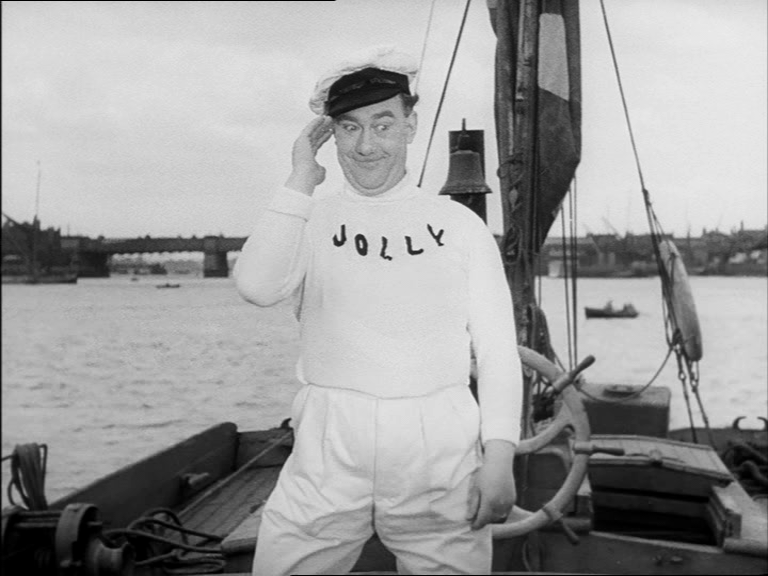 Captain Bill (Ralph Ceder, 1936) Captain Bill (Ralph Ceder, 1936)
One of the twenty-six(!) films that comic Leslie Fuller starred in between 1930 and 1945. Jeffrey Richards has cited Fuller’s films as having a distinctly proletarian sensibility, ‘emanating from those same lower depths of the film industry as the Old Mother Riley comedies’ or Will Hay’s films, and sharing with those pictures ‘a basic sympathy and a familiarity with the surface details of working-class life’ (2010: 304). Throughout these films, Fuller sketched different characters (usually called Bill) but with similar traits: the protagonist in a Fuller picture was invariably ‘a good-hearted bruiser, devoted to his family, his betting and his booze, and cheerfully work-shy’, best described as ‘an endearing lummox of the type popularized by Victor McLaglen’ (ibid.). Fuller’s films were popular to the point that the director Norman Lee, who worked with Fuller a number of times, claimed Fuller’s screen persona to be ‘second only in popularity to Gracie Fields in some areas’ (Lee, cited in ibid.). Gill Plain has suggested that the comic performances of Fuller, Will Hay and George Formby characterised the representation of British men in much of thirties cinema, taking over from the melodramatic and exotic ideal of masculinity in 1920s British cinema (embodied by Ivor Novello and Henry Kendall), which was eventually supplanted by the more heroic depiction of masculinity in the British films produced during the wartime era and beyond (Plain, 2006: 39). It’s been suggested that depictions of masculinity in British cinema were heavily impacted by the cultural fallout of the First World War, with British films for a long time demonstrating ‘a lack of interest in manliness’ which resulted in a focus on the dandy (Novello) or the comic (Fuller, Hay) (ibid.). 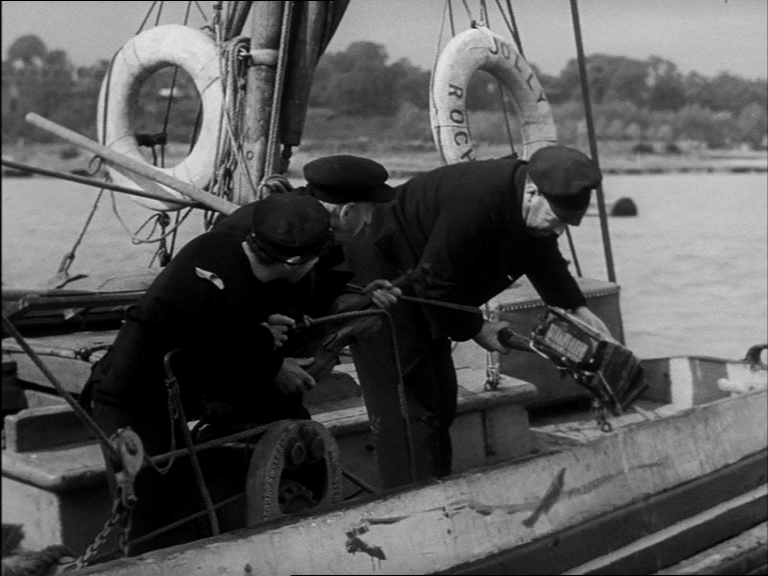 Very often the ‘poverty’ of Fuller’s films’ production contexts ‘helped to ensure authentically poor surroundings’ for Fuller’s working-class (anti-)heroes (Richards, op cit.: 304). In the films, Fuller essayed a variety of proletarian characters. Here, in Captain Bill, he plays the owner of a barge, the Jolly Rochester. Bill has returned to London with a new tooth to improve his looks and a ring for his beloved, his son Jackie’s schoolteacher Polly Campbell (Judy Kelly), and the intention to ask for her hand in marriage. Bill faces prejudice from the captain of Sir Anthony Kipps’ yacht, Wilson, who tells Bill, ‘Do you mind shifting that floating dog’s kennel [the Jolly Rochester]?’ ‘You’re an anchor short’, Bill responds, ‘a nice […] one round your neck’. However, much to Wilson’s surprise, Bill is a friend of Kipps, having saved Kipps’ life once before. Kipps’ friendship with Bill is also a cause for concern for Kipps’ snooty wife (Toni Edgar-Bruce). Very often the ‘poverty’ of Fuller’s films’ production contexts ‘helped to ensure authentically poor surroundings’ for Fuller’s working-class (anti-)heroes (Richards, op cit.: 304). In the films, Fuller essayed a variety of proletarian characters. Here, in Captain Bill, he plays the owner of a barge, the Jolly Rochester. Bill has returned to London with a new tooth to improve his looks and a ring for his beloved, his son Jackie’s schoolteacher Polly Campbell (Judy Kelly), and the intention to ask for her hand in marriage. Bill faces prejudice from the captain of Sir Anthony Kipps’ yacht, Wilson, who tells Bill, ‘Do you mind shifting that floating dog’s kennel [the Jolly Rochester]?’ ‘You’re an anchor short’, Bill responds, ‘a nice […] one round your neck’. However, much to Wilson’s surprise, Bill is a friend of Kipps, having saved Kipps’ life once before. Kipps’ friendship with Bill is also a cause for concern for Kipps’ snooty wife (Toni Edgar-Bruce).
During a barge race, on which Bill has staked fifty pounds, the Jolly Rochester begins to fall apart: the anchor drops, the rudder falls off and the ship’s wheel comes detached from the helm. Finally, the ship takes on water and sinks. Without a ship, Bill and his crew are forced to find other employment, working as shovellers on a coal barge and as street musicians. One evening, whilst busking, Bill is offered a job by a gang of gun runners. Bill turns them down, which leads to a pub brawl. Escaping from this, Bill encounters Kipps, who offers Bill the job of working as the captain on Kipps’ yacht – Kipps having sacked Wilson. One evening, with Polly and Jackie on board Kipps’ yacht, along with a group of Kipps’ guests, the gun runners board the ship and force Bill to lock the guests below decks. Lady Kipps, who already disapproves of Bill’s employment as the yacht’s captain, believes that Bill is complicit in the gang’s hijacking of the yacht. With the lives of Polly and Jackie at stake, Bill must foil the gang’s plan and rescue the hostages. 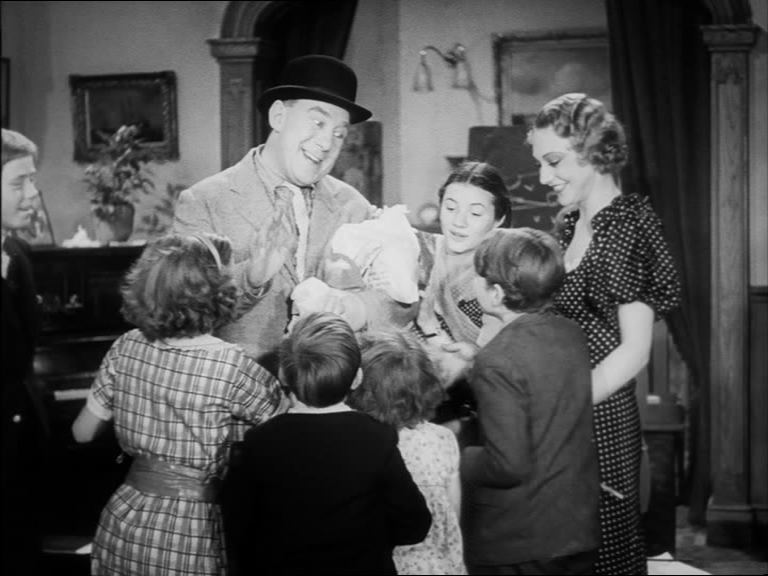 The film is filled with little visual gags: Bill’s opening declaration of ‘All hands on deck’ is followed by shots of animals climbing onto the deck of the Jolly Rochester from below decks – the ship’s dog, a cat, a mouse. Much fun is made of Bill’s desire to marry Polly. Invited aboard Kipps’ ship for a drink, much to the chagrin of the snobbish Wilson, Bill tells Kipps that ‘Since the kiddy’s [Jackie’s] mother died, you know what it is: I hate me own cooking, I ain’t got a sock without a hole in it, me hot water bottle leaks’. In response to this, Kipps says, ‘Take my advice: do your own cooking, darn your own socks, and stick to your leaky hot water bottle’. Later, Bill shows the ring he has bought to his crewmember Cheerful (D J Williams), a sour-faced, slow-moving old-timer. ‘It don’t look so good to me’, Cheerful tells Bill, ‘Engagement rings remind me of ‘and-cuffs’. ‘You know, I’d invite you to the wedding’, Bill responds, ‘if it was a funeral’. The film is filled with little visual gags: Bill’s opening declaration of ‘All hands on deck’ is followed by shots of animals climbing onto the deck of the Jolly Rochester from below decks – the ship’s dog, a cat, a mouse. Much fun is made of Bill’s desire to marry Polly. Invited aboard Kipps’ ship for a drink, much to the chagrin of the snobbish Wilson, Bill tells Kipps that ‘Since the kiddy’s [Jackie’s] mother died, you know what it is: I hate me own cooking, I ain’t got a sock without a hole in it, me hot water bottle leaks’. In response to this, Kipps says, ‘Take my advice: do your own cooking, darn your own socks, and stick to your leaky hot water bottle’. Later, Bill shows the ring he has bought to his crewmember Cheerful (D J Williams), a sour-faced, slow-moving old-timer. ‘It don’t look so good to me’, Cheerful tells Bill, ‘Engagement rings remind me of ‘and-cuffs’. ‘You know, I’d invite you to the wedding’, Bill responds, ‘if it was a funeral’.
Alongside the comedy are some almost documentary-like moments depicting life as it was: as the barge travels along the Thames, Bill sings, ‘Old Father Thames’ and we are treated to travelogue-style shots, from the perspective of the barge, of the banks of the Thames and other ships as they pass and – presumably acknowledging the presence of the camera – stare and wave. British comedy films of this era often highlighted the representation of the British working class during the 1930s as ‘figures of fun’ (Napper, 2012: 41). This comic depiction of working class characters in 1930s British cinema divided audiences, with C A Lejeune, for example, asserting that ‘[w]e have an industrial north that is bigger than Gracie Fields running around a Blackpool funfair’ (Lejeune, quoted in ibid.). On the other hand, Napper argues, ‘for most [working-class] audiences comedy was central to their understanding of cinema itself’ (ibid.). For many working-class film-goers, these ‘“figures of fun” constituted some of the most popular and best loved entertainers’ in an era in which thirty-eight per cent of British films were comedies, evidencing the genre’s ‘industrial importance and continuing appeal to popular audiences’ (ibid.). Within these films, working-class characters, ‘figures of fun’ or not, ‘where never peripheral comic characters in films of otherwise serious intent, but rather they were the central attraction in cycles of films entirely built around their comic personas’ (ibid.: 41-2). The pictures themselves were often concerned with ‘the boundaries of class’, demonstrating that ‘class and class-consciousness was written into the very fabric of these comedy films’ (ibid.). Like many 1930s comedies, Fuller’s films, such as The Last Coupon (1932) – in which Bill (Fuller) and his wife Polly earn a win on the football pools and find themselves out of place in high society – usually reinforced the existing class structure, showing that ‘people are funny when they try to be what they are not, so they should stick to their own class. The existing class structure is thus consistently affirmed’ (Richards, op cit.: 213). Captain Bill focuses heavily on the issue of social class and the prejudice Bill faces from Lady Kipps and the captain of the Kipps’ yacht, Wilson. This is overcome at the end of the film, when Bill proves himself to be a hero. However, though Kipps and Bill may be friends and equals in that sense, the class boundaries that exist between the pair are insurmountable – but that this social difference should not necessarily be framed in negative terms. 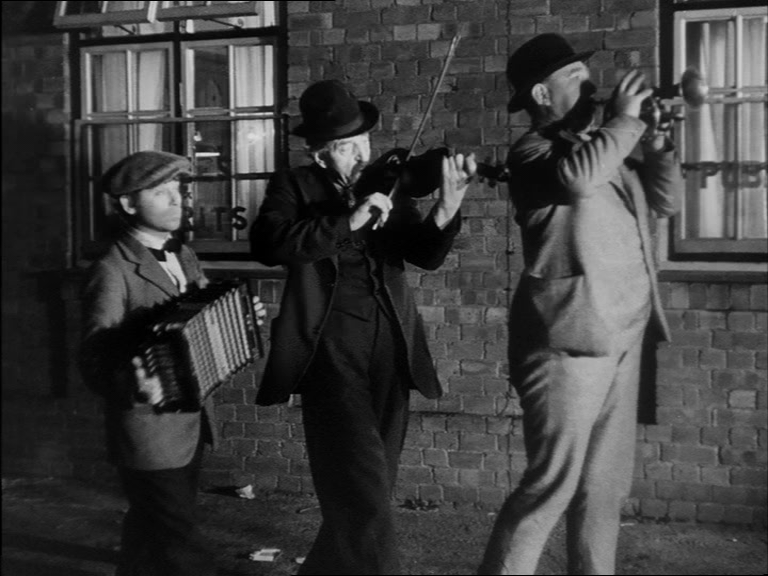 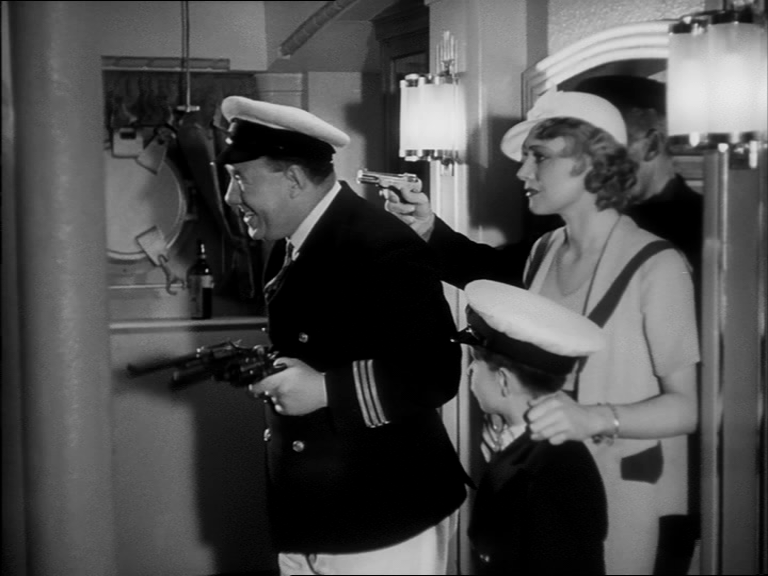 The film is uncut and runs for 76:18 mins (PAL).
Video
Shot in monochrome, on 35mm film, Captain Bill is presented in its original aspect ratio of 1.33:1. A remarkably clean source print has been used, and the presentation evidences good contrast, although in a few sequences the highlights seem a little too ‘hot’ and detail is lost within them. There is some minor telecine wobble here and there too. In all, it’s a pleasing presentation; very good for a film of this vintage. 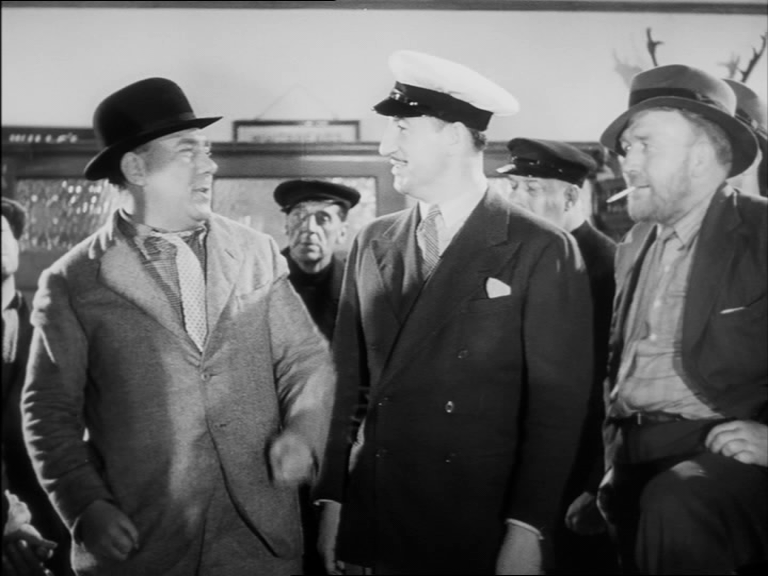 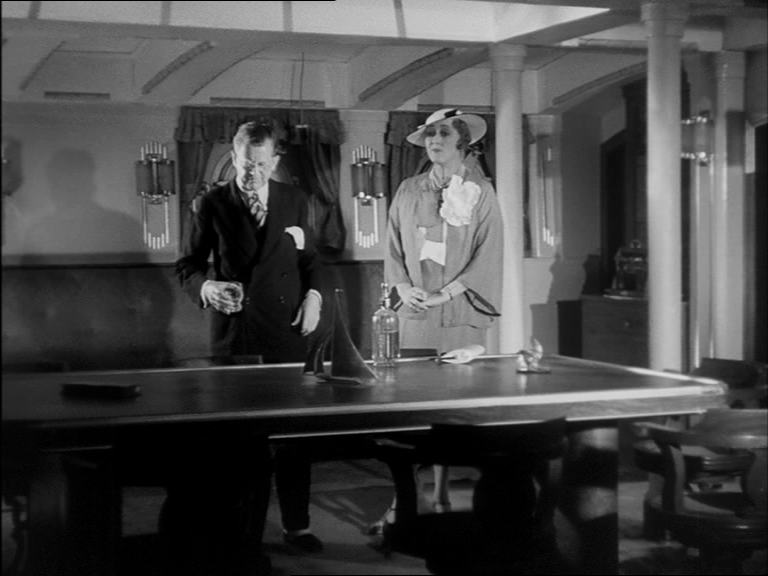
Audio
Audio is presented via a two-channel mono track. This is clean and dialogue is audible throughout. Sadly, there are no subtitles.
Extras
The disc includes a stills gallery (0:37). Also included are the film’s original press release and an official synopsis (both as .PDF files).
Overall
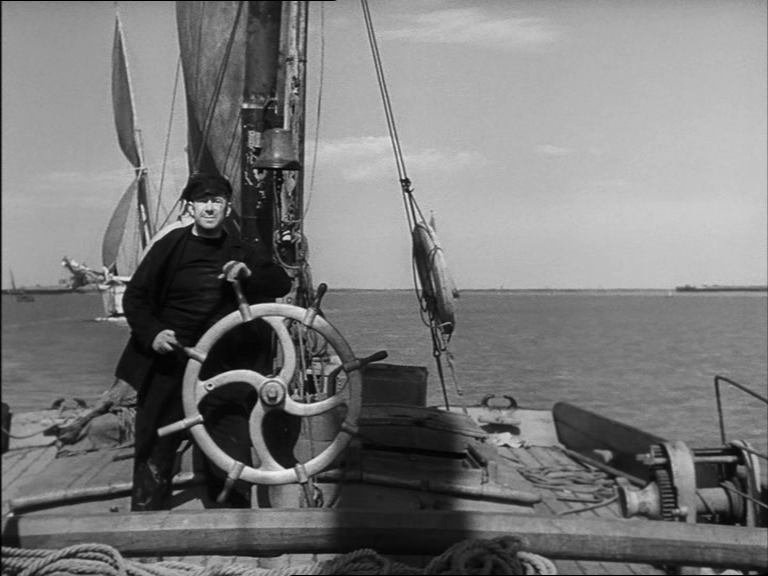 An entertaining slice of 1930s British comedy cinema, Captain Bill offers an engaging narrative and some light-hearted humour. Like much British cinema of this period and beyond, the film engages with issues of social class. The presentation of the film on this disc is very good; the absence of contextual material is regrettable but understandable, given the niche appeal of such a release. An entertaining slice of 1930s British comedy cinema, Captain Bill offers an engaging narrative and some light-hearted humour. Like much British cinema of this period and beyond, the film engages with issues of social class. The presentation of the film on this disc is very good; the absence of contextual material is regrettable but understandable, given the niche appeal of such a release.
References: Napper, Lawrence, 2012: ‘“No Limit”: British Class and comedy of the 1930s’. In: Hunter, I Q & Porter, Laraine (eds), 2012: British Comedy Cinema. London: Routledge: 38-50 Plain, Gill, 2006: John Mills and British Cinema: Masculinity, Identity and Nation. Edinburgh University Press Richards, Jeffrey, 2010: The Age of the Dream Palace: Cinema and Society in 1930s Britain. London: I B Tauris This review has been kindly sponsored by: 
|
|||||

|